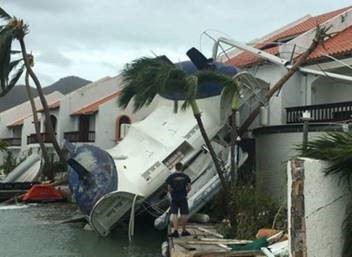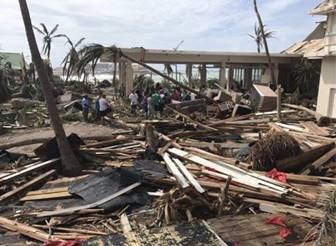Be prepared during hurricane season

The hurricane season extends from May 15 to November 30. Although warm destinations are beautiful, Canadians who live near the North Atlantic and northeast Pacific oceans, or who might travel to these locations, should be careful since they can sometimes be hot spots for extreme weather, including hurricanes.

An overturned boat crashed into waterfront apartments during Hurricane Irma (2017).
Céline, who works at the Consulate General of Canada, Miami, has been helping Canadians prepare for hurricanes in Florida, Puerto Rico and the United States Virgin Islands since her arrival in Miami, Florida, in 2017—1 month before Hurricane Irma and Hurricane Maria occurred. According to Céline: "Although most long term Canadian residents are used to hurricanes, it's easy to assume you're ready and not take sufficient time to ensure you have everything you need before the peak season starts. Even in Florida, we experience shortages of gas, water and other essential items even when hurricanes never reach us" It's important not to wait until the last minute to prepare. You may need to evacuate quickly since the path of a hurricane may change. "Our mission prepares by having options for alternate service delivery points, as well as lodging, since many of us live in mandatory evacuation zones," states Céline.
The High Commission of Canada to Barbados also prepares for hurricane season every year. Robin, who has worked at the office during some of the most recent storms, notes that "because Canada isn't really directly affected by hurricanes, Canadians aren't always fully aware of the threat. However, in Barbados, it's their reality. They go on hurricane watch mode every year and the storms seem to be getting worse and worse."

Debris surrounds the entrance of a beach resort after Hurricane Irma (2017).
Robin remembers when several islands in the eastern part of the Caribbean region were hit by Hurricane Irma and Hurricane Maria in 2017: "When a major hurricane touches down it causes significant damage and the airports are often affected as well. When this happened in the past, it greatly limited our means of getting to the more isolated areas."
Consular teams help Canadians by setting up meeting places, facilitating their departure when possible and issuing emergency travel documents to help them get back home. Robin emphasizes that "no matter the obstacles, our main objective is always to help Canadians."
Robin recommends that you take the time to read the Travel Advice and Advisories for your destination, as they contain useful information about safety and security conditions abroad and are updated regularly. She also urges all Canadian travellers to sign up for the Registration of Canadians Abroad service: "When Canadians are registered, they immediately receive important information before or during a hurricane. It's been very helpful in notifying Canadians if a hurricane is coming, telling them if evacuation is required and where this evacuation will take place."
Ultimately, the best thing you can do to travel safely, no matter where you go, is to be informed and prepared; but if ever you're abroad, consular officers are always willing and ready to help you.
Visit travel.gc.ca for information on travelling in Canada or abroad.
- Date modified: